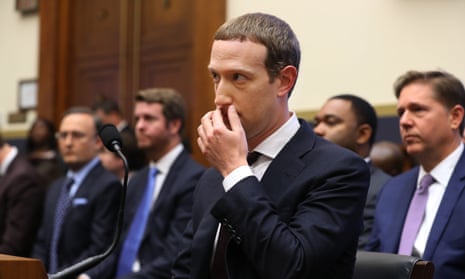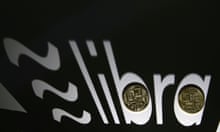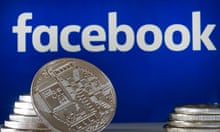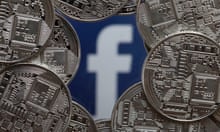Mark Zuckerberg faced hostile questioning in the US Congress from politicians of both parties as he sought to reassure them the planned digital currency Libra could be a force for good.
The more than six hours of testimony before the House financial services committee on Wednesday came as the social network faces calls from lawmakers to be broken up. While the event was intended to focus on Libra, House members used Zuckerberg’s rare appearance to grill him on topics including political bias, fact-checking, and the Cambridge Analytica data scandal.
Libra, the digital currency developed by Facebook, was set to roll out in 2020 but has faced pushback from lawmakers, who have questioned how it would be regulated and expressed fears it could used for illicit activity or become vulnerable to privacy abuses. Several financial partners, including Mastercard, Visa, PayPal and eBay, have abandoned the project.
In his opening statement, Zuckerberg said that if the US did not allow the launch of a cryptocurrency, China would beat it to the field.
“China is moving quickly to launch similar ideas in the coming months. If America doesn’t innovate, our financial leadership is not guaranteed,” he said.
Zuckerberg said Facebook would not back any move by the Libra Association, a consortium of 21 members including venture capital firms and not-for-profit groups, to launch the cryptocurrency until it had satisfied all US regulatory concerns. This signaled more caution than the company had agreed to before, but Zuckerberg sidestepped an attempt to pin him down on promising a moratorium on plans for Libra.
The Democratic congressman Brad Sherman of California criticized Zuckerberg’s claims that Libra will help poor and unbanked people around the world enter the financial system.
“The poor and unbanked need pesos, they need dollars that they can buy something at a local store,” he said. “You’ve done no effort to help the unbanked anywhere else and any other time.”
He said an anonymous currency was more likely to help drug dealers and other people seeking to circumvent traditional financial systems more than the poor and unbanked.
“For the richest man in the world to come here and hide behind the poorest people in the world, and say that’s who you’re really trying to help,” he said. “You’re trying to help those for whom the dollar is not a good currency – drug dealers and tax evaders.”
Under fire before the 2020 election
Wednesday’s hearing came in the wake of Facebook’s recent disclosure that it had removed a network of Russian and Iranian accounts targeting US voters on Instagram, which it owns, and lawmakers refused to let Zuckerberg off the hook when it came to voicing concerns ahead of the 2020 presidential election.
The Democratic congresswoman Maxine Waters told the CEO: “It would be beneficial for all if Facebook concentrates on addressing its many existing deficiencies and failures before proceeding any further on the Libra project,” Waters said.
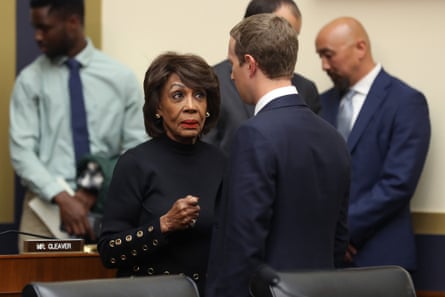
She also quizzed Zuckerberg on a range of issues including Facebook’s lack of corporate diversity, its limited steps to combat misinformation in advertising on its network, and the dangers of that leading to voter suppression.
“All of these problems I’ve outlined, and given the scope and the size and reach [Facebook has], it should be clear: while we have serious concerns about your plans to establish a global digital currency that will challenge the US dollar … we have also opened up a serious discussion about whether Facebook should be broken up,” she said.
In a standout exchange, the congresswoman Alexandria Ocasio-Cortez grilled Zuckerberg over the Cambridge Analytica scandal, asking him at what point he personally learned about it and at what point other executives became aware.
Zuckerberg claimed that he learned of Cambridge Analytica “around the time [the news] became public … around March of 2018”. Ocasio-Cortez asked if anybody on Zuckerberg’s leadership team knew about the firm prior to a report published by the Guardian on 11 December 2015.
“I believe some folks were tracking it internally,” Zuckerberg said. “I do think I was aware of Cambridge Analytica as an entity earlier, but I don’t know if I was tracking how they were using Facebook specifically.”
It was the Cambridge Analytica scandal that last brought Zuckerberg before Congress in April 2018, amid a global outcry over the political consulting firm’s misuse of Facebook customer data in the US 2016 presidential election and the Brexit referendum.
That scandal damaged Facebook’s image in Washington and has compounded worries among lawmakers that the social media giant cannot be trusted to launch a global digital currency to its 2.4 billion users.
The Democratic lawmaker Rashida Tlaib said she was speaking to Zuckerberg both as a congresswoman and “as the mother raising two Muslim boys during what is a pretty dark time in our world”. She asked why he was letting hate groups use Facebook events pages to organize.
Zuckerberg acknowledged Facebook’s failings.
“I think we could do more and do a better job here,” Zuckerberg said. “We aren’t perfect, and we make a lot of mistakes.”
Not all lines of questioning were confrontational. Roger Williams of Texas and French Hill of Arkansas congratulated Zuckerberg for his efforts to innovate.
“I congratulate you, like so many of my colleagues, on the extraordinary investment and entrepreneurial success of creating Facebook,” Hill said. “I do admire people in our capitalist system here that are disruptors – that find the weakness and try to exploit it with a new product that’s better for consumers.”
Williams ended his questioning with a final statement for Zuckerberg: “I’m really glad you’re a capitalist.”
The Republican representative Barry Loudermilk appeared to compliment the Facebook founder by comparing him to Trump.
“You’re both very successful businessmen, you’re both capitalists, you’re both billionaires, and you’ve done very well,” he said. “But I think really what you share in common is you both challenge the status quo – he calls it draining the swamp, you see it as innovation.”
